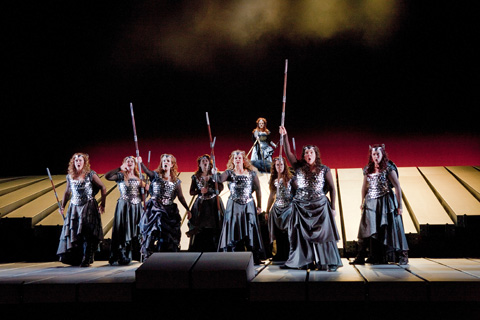
READY FOR THEIR CLOSE-UP The cast of the Met's telecast of the Wagner Ring cycle stand tall.
|
Given the high cost of productions and, therefore, the high price of tickets, opera companies have a hard time staying in business. Since the turn of the last century, Boston alone has lost at least four major companies, including the beloved and recently deceased Opera Boston. Even the Metropolitan Opera has its financial woes. But it's had one phenomenal success — the high-definition telecasting of live Saturday matinees to movie theaters and other concert venues around the world. The first "Met in HD" telecast, The Magic Flute, in 2006, went out to 98 theaters in four countries. Now in its sixth season, the Met telecasts play in some 1700 theaters in 54 countries (this year including China, Russia, Israel, and Morocco, with subtitles in English, French, German, Italian, Portuguese, Russian, and Spanish for the live feed, and Chinese, Japanese, and Korean for delayed screenings). This year's audience, each paying approximately $20, numbers nearly three million. The series has won two Emmys and a Peabody Award.
Those are the stats. It's an amazing accomplishment. It's also clearly a boon for opera lovers who have no immediate access to live performances, or who can't afford the high ticket prices. I see the same people returning Saturday after Saturday, many of them not speaking English (often Russian), and bringing their own lunches, although some of the movie theaters prohibit bringing in food from beyond their own concessions. At the theater in Revere, where I usually go, you can buy an inexpensive and (I'm told) good fresh sandwich, soda, and chips right in the theater where the screening itself takes place. Most theaters don't reserve seats, so many people come in early, plunk their coats down on the best seats, and then go out into the lobby for food. Later-comers occasionally resent this and have to scrounge for seats that are not too far back or too close up.
Opinions about the experience itself are quite variable. If you're an experienced operagoer, you know that however good the sound transmission may be (and the sound systems at some theaters are better than at others — one Boston theater wasn't actually transmitting in HD until this year), it's nothing like going to a live performance. Often the balances are unnatural: voices can be made to sound louder than the orchestra. One singer in the Wagner Ring cycle was much criticized for being inaudible at the Met, but in HD he could be heard as easily as anyone else. On lesser sound systems, the voices sound artificial. And even when the sound is better, and the electronic nature of the transmission isn't as noticeable, it's still not as thrilling as hearing a "real" voice coming from an actual stage. The various celebrity interviewers, the regular intermission feature, always remind the audience that there's nothing like opera in an opera house. The Met still wants to sell tickets to the Met itself.